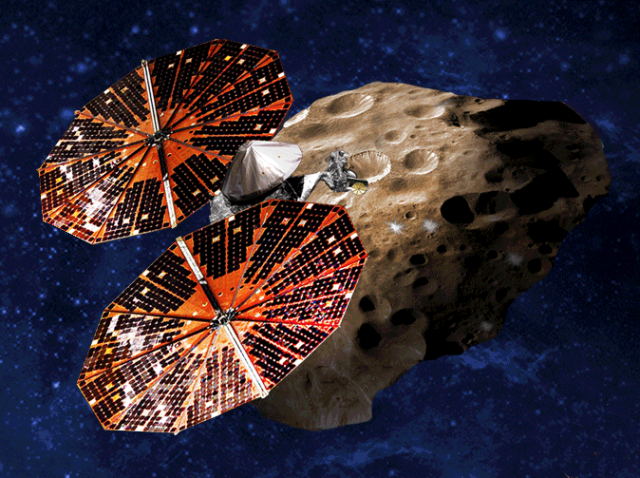Washington. October 18. INTERFAX - One of the solar panels of the Lucy probe, launched to study Trojan asteroids near Jupiter, could not be fixed in a state of full disclosure, the US National Aeronautics and Space Administration (NASA) reported.
"Two Lucy solar panels have opened, both generate electricity and charge the battery. But while one of the panels was fixed (in a state of full disclosure - IF), according to our information, the other panel was not fully fixed," says a blog post on the NASA website.
"All subsystems are working fine. Lucy can continue her work, nothing threatens the safety and condition of the probe. The team analyzes data from the spacecraft to assess the situation and determine the measures necessary for the full disclosure of the solar panel," the space administration noted.
The launch was carried out using the Atlas V launch vehicle of the United Launch Alliance from the launch pad SLC-41 at the Cape Canaveral cosmodrome in Florida on October 16 at 05:34 East Coast time (12:34 GMT).
After entering orbit, the solar panels on the probe successfully opened, which began to power the spacecraft's systems. A connection has been established with the probe.
The 1.5-ton spacecraft will study two large groups of Trojan asteroids, which can provide information about the initial period of formation and evolution of the planets of the Solar System.
"This is a unique opportunity for discoveries, as we will explore the distant past of our Solar System," said Tom Statler, a Lucy project scientist at NASA.
Asteroids have been in pristine condition since the beginning of the formation of the Solar System 4.5 billion years ago. Lucy will make a series of flights at the closest possible distance from asteroids in order to study the geology, chemistry and physics of these bodies of the Solar System.
The mission of the 6.3 billion km long spacecraft will last 12 years. Lucy will conduct research only during asteroid rendezvous. His entire scientific load consists of means of remote observations. No descent modules and soil fences are expected. The probe's scientific instruments will provide detailed images of the surface of asteroids, determine their mass, properties and composition of the surface layer, including the presence of water ice and organic substances.
The first flight of the spacecraft past the Trojan asteroid, which is in the same orbit as Jupiter, is expected on April 20, 2025, and the last one in 2033. In total, the probe will study eight asteroids during a series of flights.
The cost of the mission is estimated at $981 million.
The device was named Lucy in honor of a female of the genus Australopithecus, whose skeleton was discovered in November 1974 in Ethiopia. This ancestor of man after the discovery was named "Lucy" in honor of the Beatles song - Lucy in the Sky with Diamonds ("Lucy in heaven in diamonds"). The find gave a unique insight into human evolution.

